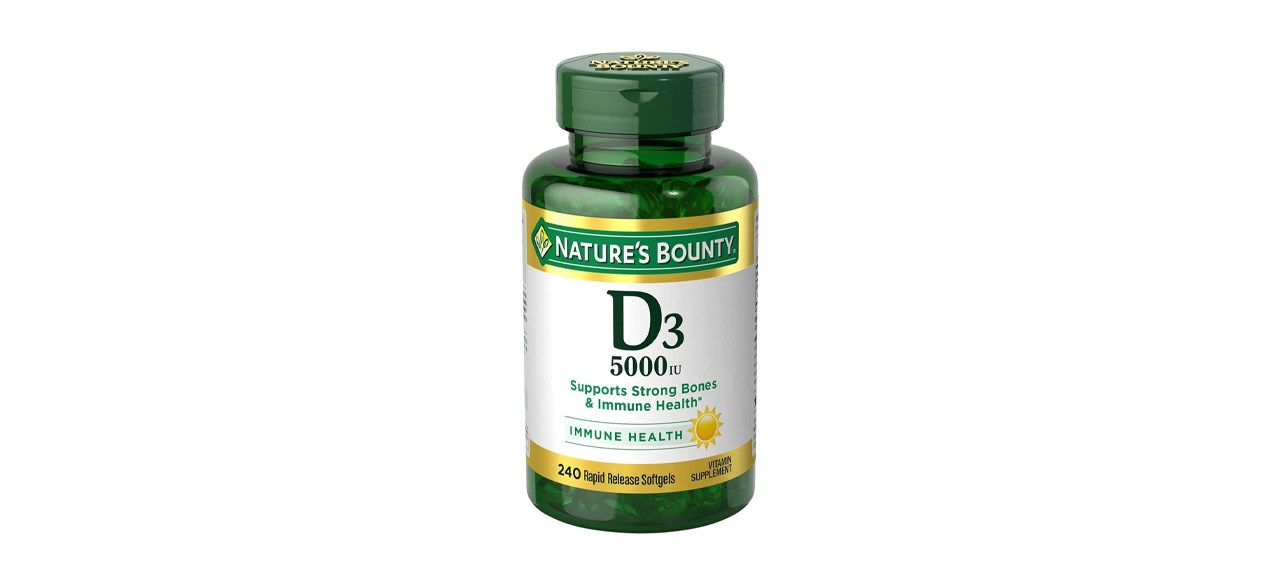BestReviews is reader-supported and may earn an affiliate commission. Details.
Protect yourself from the flu by taking care of your immune system
The fall brings cooler weather, autumn leaves and, unfortunately, the flu. According to the Centers for Disease Control and Prevention, seasonal flu occurs year-round in the United States, but usually occurs more often in the fall and winter. Flu activity significantly increases in October and peaks between December and February.
While getting a flu vaccination every year lowers the risk of getting the flu, you can do a few more things to stay healthy.
To reduce your risk of developing the flu this fall, protect your health by boosting your immune system.
Shop this article: NewRhythm Probiotics 50 Billion CFU, Nature’s Bounty Vitamin D3 and MaryRuth Organics Elderberry Liquid Drops
Seasonal influenza
According to the CDC, seasonal influenza (flu) is a contagious respiratory condition caused by influenza viruses affecting the nose, throat and lungs. There are two main flu virus types: A and B. These two flu types are the primary causes of yearly seasonal flu epidemics.
Certain people are more susceptible to getting the flu, such as:
- People 65 and older.
- Young children.
- People with specific health conditions, such as asthma, diabetes and heart disease.
- People who are pregnant.
- People with disabilities.
- People who identify as Black, Hispanic, American Indian and Alaska Native.
- People with a body mass index of 40 or higher.
- People residing in nursing homes or other long-term-care facilities.
Common symptoms of the flu
In the early stages of infection, the flu replicates the common cold. You can experience a runny nose, sneezing and a sore throat. However, the primary difference between the flu and the cold is that the cold develops slowly, while the flu occurs suddenly.
As reported by the Mayo Clinic, the most common flu symptoms are:
- Aching muscles.
- Fever.
- Chills and sweats.
- Headaches.
- Dry, recurring cough.
- Shortness of breath.
- Sore throat.
- Runny or stuffy nose.
- Pain in the eyes.
- Vomiting and diarrhea.
The flu is usually treated at home with medications and home remedies without visiting a health care provider.
However, if you fall within one of the above-mentioned groups of people more susceptible to the flu, it’s recommended that you seek medical attention, as the virus may cause more serious health complications.
Flu symptoms that require emergency medical attention for adults include the following:
- Chest pain.
- Difficulty breathing.
- Seizures.
- Worsening of pre-existing conditions.
- Severe weakness or muscle pain.
- Ongoing dizziness.
Easy ways to prevent the flu and boost your immune system
If you want to lower your chances of developing the flu this fall, focusing on staying germ-free and boosting your immune system is crucial. It’s important to note that while these tips can help you stay healthy, they don’t guarantee that you won’t get sick. However, because you’ve actively worked to protect your health, your experience with the flu may not be too terrible.
Here are some tips for flu prevention tips, according to the Mayo Clinic Health System:
Limit the spread of germs
Practice good hygiene and always wash your hands to prevent the spread of germs. Also, wash your fruits and vegetables before eating or cooking. Thoroughly clean your glasses, spoons, forks and other utensils to limit the spread of germs and bacterial growth.
Eat a healthy, balanced diet
Eating a healthy diet is important to fuel your body and improve your immune system. Aim to consume five to nine servings of fruits and vegetables daily to get your vitamins, minerals and antioxidants, all key nutrients for immune health.
Get enough sleep
Make sure that you’re getting enough sleep every night. Inadequate sleep may lead to illness and poor health. Adults need seven or more hours of sleep a night.
Reduce stress
Find healthy ways to cope with stress, such as meditating, listening to music or journaling. Physical activity is another great stress-management technique that can help you lower your stress and keep you active, thus boosting your immune system.
Take nutrients for immune system health
Depending on your diet, you’ll consume many nutrients necessary to boost your immune system and lower the risk of the flu. However, you can take supplements to ensure you get all your nutrients.
Here are the immune-boosting nutrients that can help prevent the flu:
- Beta carotene.
- Vitamin C.
- Vitamin D.
- Probiotics.
- Protein.
- Zinc.
Best products to boost your immune system

NewRhythm Probiotics 50 Billion CFU
These probiotics contain 50 billion living organisms per serving that deliver healthy intestinal flora to support immune health. They are non-GMO, gluten-, sugar-, soy-, yeast-, dairy- and fish-free. They are shelf-stable, so they don’t need to be refrigerated.

Get immune support and stronger bones with these vitamin D supplements. The 240-count soft gels help maintain your body’s vitamin D levels. They have a non-GMO formula, are gluten- and sugar-free and don’t contain artificial colors or sweeteners.

MaryRuth Organics Elderberry Liquid Drops
Elderberry has been shown to help support the immune system. These elderberry liquid drops contain 30 servings and can be taken as a tincture or mixed into drinks. They have a vegan formula containing ingredients such as organic elderberry extract, purified water, organic glycerin, organic raspberry and organic blueberry.
Want to shop the best products at the best prices? Check out Daily Deals from BestReviews.
Sign up here to receive the BestReviews weekly newsletter for useful advice on new products and noteworthy deals.
Taneia Surles writes for BestReviews. BestReviews has helped millions of consumers simplify their purchasing decisions, saving them time and money.



























